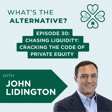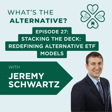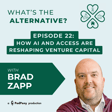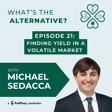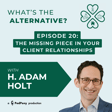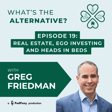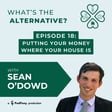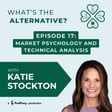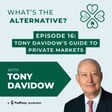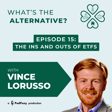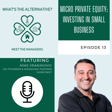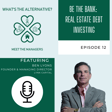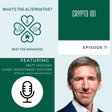
What's the Alternative? | Episode 14 | The Smoothing Effect featuring Cliff Asness
Welcome to Banrion Capital Management’s What’s the Alternative Podcast! Join host Shana Orczyk Sissel, the “Queen of Alternatives” Founder & CEO of Banrion Capital Management, as she interviews leaders in the alternative investment space. Learn more about their firms, their passions and about the many different ways investors can use alternative investments to add value in their investment portfolios.
In this episode Shana sits down with legendary hedge fund manager, Cliff Asness, to discuss how advisors can best evaluate alternative investment strategies whether public or private.
Cliff is a Founder, Managing Principal and Chief Investment Officer at AQR Capital Management. He is an active researcher and has authored articles on a variety of financial topics for many publications, including The Journal of Portfolio Management, Financial Analysts Journal, The Journal of Finance and The Journal of Financial Economics. He has received five Bernstein Fabozzi/Jacobs Levy Awards from The Journal of Portfolio Management, in 2002, 2004, 2005, 2014 and 2015. Financial Analysts Journal has twice awarded him the Graham and Dodd Award for the year’s best paper, as well as a Graham and Dodd Excellence Award, the award for the best perspectives piece, and the Graham and Dodd Readers’ Choice Award. He has won the second prize of the Fama/DFA Prize for Capital Markets and Asset Pricing in the 2020 Journal of Financial Economics. In 2006, CFA Institute presented Cliff with the James R. Vertin Award, which is periodically given to individuals who have produced a body of research notable for its relevance and enduring value to investment professionals. Prior to co-founding AQR Capital Management, he was a Managing Director and Director of Quantitative Research for the Asset Management Division of Goldman, Sachs & Co. He is a trustee for the American Enterprise Institute and the Atlas Society. He is on the governing board of the Institute of Mathematical Finance at NYU, the ambassador board of the Journal of Portfolio Management and a board member for the Q-Group. He is a member of the board of trustees and the investment committee for the National World War II Museum. He is also an advisory board member for the Adam Smith Society.
Cliff received a B.S. in economics from the Wharton School and a B.S. in engineering from the Moore School of Electrical Engineering at the University of Pennsylvania, graduating summa cum laude in both. He received an M.B.A. with high honors and a Ph.D. in finance from the University of Chicago, where he was Eugene Fama’s student and teaching assistant for two years (so he still feels guilty when trying to beat the market).
Notable Contributions- Received the James R. Vertin Award from CFA Institute in recognition of his lifetime contribution to research.
- Five-time winner of the Bernstein Fabozzi/ Jacobs Levy Award and two-time winner of the Graham and Dodd Award for his research.
- Vaughan Executive in Residence at the University of Missouri's Trulaske College of Business.
- Member of the governing board of the Courant Institute of Mathematical Finance at NYU.
- Named one of the 50 Most-Influential People in Global Finance by Bloomberg Markets magazine.
Learn More About AQR Capital Management: AQR
Connect with AQR on 𝕏: @aqrcapital
Connect with Cliff on 𝕏: @CliffordAsness
Read Cliff's Research: Cliff's Perspectives
Learn More About Banrion: Banrion Capital Management
Connect with Banrion on 𝕏:
